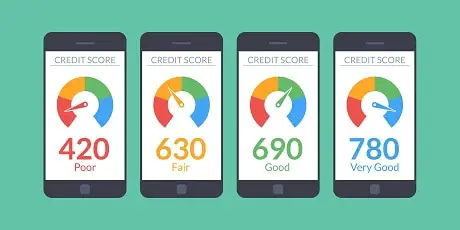Here’s the truth about leasing a van with bad credit:
You can still lease a van if you have a bad credit score. However, it may be challenging, and could affect the terms of your lease. It gets harder with a score below 670 and very difficult under 580. Most van dealerships limit who they can lease to so as to reduce their risk of financial loss.
If you’re dreaming of adding a newer-model Sprinter or Ford Transit to your business fleet while incurring lower monthly payments than with an auto loan, leasing a van can be a smart move.
And while a van can be a crucial tool in your logistics arsenal, getting one with bad credit can be a real issue but not a dead end.
In this comprehensive guide, I’ll help you figure out the credit score and other requirements you need to lease a van, the best tips for increasing your lease approval chances, how you can improve your credit scores, and alternatives to leasing a van with bad credit.
Let’s dive in, champ.
The Eligibility for Van Leasing
Lenders want to know several things before you can drive off the lot in a leased van. That’s because they must analyze the risk of you defaulting on your commitments.
A finance company may require you to provide other unique details, that’s usually the case when you’re new in business or have been refused finance previously.
But here’s what most of them want to know in general:
| For Individuals | For Businesses |
| Marital status and number of dependants | Accounts history, a balance sheet, and proof of positive trading |
| Satisfactory employment history (3+ years) | Solid address history |
| Reliable address history (3+ years) | A director who can act as a guarantor |
| Recent bank statements | A full driving license |
Bad Business Credit vs. Good Personal Credit

Here’s the perk: leasing companies treat business and personal credit ratings differently when you’re applying for a van lease.
As such, your company’s credit score and your individual credit score have no direct impact on each other.
Lenders may consider your personal credit score on a business lease when you have a start-up or if your firm has recently demonstrated a poor credit rating.
But if your business accounts, statements of bill payments, and track records of previous borrowing paint a healthy picture of your firm, your personal credit play little to no part in your qualification for a van lease.
The Credit Score You Need to Lease a Van
There’s no fixed credit score that dictates whether or not you’ll get a van on a lease, as it all depends on the finance company or van dealership. But generally, most lenders in the US consider a credit score of 670 or more a good average score.
Remember, your credit score is simply a three-digit number that predicts how likely you’ll pay a loan on time.
According to the Consumer Financial Protection Bureau (CFPB), the three major agencies that collect credit data are Experian, Equifax, and TransUnion, meaning you could have different credit scores depending on how each firm calculates them.
The Fair Isaac Corporation (FICO) provides an industry standard for making precise and fair decisions about creditworthiness, using scores that range from 300 to 850.
As FICO reports, over 90% of top lenders use FICO scores when making lending decisions.
That said, we can summarize what each score implies on your credit rating as follows:
| FICO Score Range | Credit Rating |
| 800 and above | Exceptional |
| 740 – 799 | Very Good |
| 670 – 739 | Good |
| 580 – 669 | Fair |
| Below 580 | Poor |
While it’s possible to lease a van with bad credit, the low credit scores may alter the terms of your lease.
Understandably, a dealer may request a larger down payment (security deposit) or a higher interest rate. It’s also not uncommon that they’ll give you fewer van options to choose from.
Just so you know what to expect fully, the leasing company may turn you down if they think you can’t afford to lease a van at their rates or under certain terms.
Pro Tip: It’s normal to see slightly different credit scores as they’re calculated at different times and in different ways.
How to Improve Your Van Lease Approval Chances

Interestingly, you can tip the odds in your favor before and when applying for a van lease.
According to Credit Karma, here’s how to improve your chances of securing a van lease:
- Make a larger down payment
- Lower your debt-to-income ratio
- Get a guarantor (co-signer)
Additionally, you can try a joint application.
Make a Larger Down Payment
It’s good practice to save money that you’ll use for making a bigger down payment when applying for a van lease.
It’s called capitalized-cost reduction, and the advantage is that you’ll effectively lower the amount of your lease and monthly payments, which may raise your chances of approval.
Still, many leasing companies have limitations on the amount of down payment you can make.
Lower Your Debt to Income Ratio (DTI)
Your DTI is a simple calculation we get by dividing your monthly debt payments by your monthly gross income. Lenders prefer a lower DTI as one of the factors that determine good creditworthiness.
Get a Guarantor
If you have someone with a more favorable credit rating and you trust each other, like a close friend or relative, you can ask them to co-sign your lease.
Getting a guarantor gives the leasing company a higher confidence level that they’ll receive timely payments.
There’s a caveat in this: if you fail to pay, the person who co-signed with you will be on the hook. So pay well to save them the trouble.
Try a Joint Application
Two people may apply for a van lease together, which we call a joint application.
This comes in handy when one of the parties has a poor credit history while the other has a more appealing one.
While some leasing companies may accept joint applications, others don’t, so don’t frown if you miss this option.
Alternatives To Leasing a Van With Bad Credit
While bad credit may stand in your way of qualifying for a van lease or getting favorable terms, you could try out other options to land your dream van.
Here are three alternative options to leasing a van with bad credit:
1. Try a Lease Swap
A lease swap (lease transfer) allows you to shift a van lease from one driver to another. Again, you may only use this option with a very close friend or relative.
Alternatively, you could find a service specializing in connecting leaseholders with people who wish to take over their existing leases.
2. Opt for Van-sharing Services

Depending on your city, you could find a good company that offers van sharing services, so you can rent one for a short while – ranging from just a couple of hours.
3. Get Special Financing From a Dealership
Some dealerships have dedicated financing departments that work with clients who have lower credit ratings.
If your dealer has one, it can be an excellent move to drive down a bargain for a van lease that suits your budget and ability to pay.
How to Improve Your Credit Score for Van Leasing
If you’ve been turned down for van financing multiple times, it’s best to take a break from any further applications and work on beefing up your credit score.
According to the CFPB, here’s how you can build a strong credit score:
1. Go Through Your Credit Reports
Be sure to fast-check your credit reports and dispute any errors that may unnecessarily reduce your credit scores.
If there are old credit card accounts you aren’t using, be careful so that an identity thief doesn’t get their hands on them.
Pro Tip: Remember, under the Fair Credit Reporting Act, you’re entitled to the accuracy, fairness, and privacy of information stored in the files of consumer reporting agencies.
2. Always Pay Your Loans on Time
Watch out for late or missed loan and bill payments since they could take a toll on your credit scores.
It’s good practice to set up electronic reminders to keep on top of your payment due dates, and you could easily achieve this with your smartphone.
You can also set up automatic payments, so you always pay on time, every time.
3. Stay Below Your Credit Limit

You should only use a reasonable percentage of your total credit limit, and experts advise that you stay well within 30% of the limit.
While you may be tempted to close some credit card accounts and put most or all of your credit balances onto a single card, it’ll damage your scores. Curiously, that’s just another way of maxing out your credit limit, so avoid it.
Ultimately, you don’t always have to revolve on credit cards to get appealing scores. Try paying off your balance each month if you can.
4. Build a Long Credit History
Credit scores reflect the experience you have with paying your dues on time. So be responsible in the long run if you want things to play out cool with van leasing companies.
5. Only Apply For the Credit You Need
Too many credit applications in quick succession could paint a nasty image of you and push for hard inquiries into your credit reports.
As it turns out, such inquiries point out to lenders that your economic circumstances have tipped for worse. A van leasing company may then not be happy to approve your lease.
Pro Tip: The FTC advises that you can get and review your credit reports free of charge from Annual Credit Report, the only authorized website for free credit reports.
Final Thoughts
Leasing a van is a beautiful strategy for driving the latest model; besides making lower monthly payments, enjoying the freedom of fixing the payments, and potential tax benefits.
While you can lease a van with bad credit, you may encounter a difficult approval process. And even if you get approval, you’ll likely incur a higher financing cost and deal with additional terms.
Depending on your financial situation, you could try out some alternatives to van leasing, like swapping a lease. Overall, it’s good to beef up your credit score for future lease agreements.

